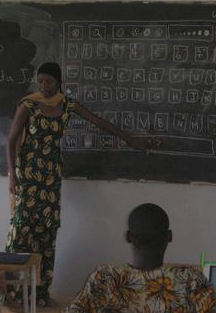During last year's Give One Get One, the lead OLPC reporter for Laptop Magazine, a beautiful Joanna Stern, asked me about starting a OLPC pilot in Mali. Laughing at the complexity of such an adventure, I told her it would be possible, but surely a voyage of discovery for her and Laptop Magazine.
Now, about a year later, Laptop Magazine is reporting on the fruits of Joanna's long labours - 30 XOs for the 3rd and 4th graders in the Mali Rising Foundation's village school in Quessoborgo village.
Led by former LAPTOP employee, Salimata Fandjalan Bangoura, this pre-pilot program for 30 students during a 5 week summer program will hopefully both show the effects of the XO laptop on children, and give Laptop Magazine readers a glimpse into the complexity of OLPC pilot programs.
Teacher Training
Salimata began by training two teachers, four volunteers, and the school director, none of whom had used a computer before. While others have dismissed teacher training, Salimata understands that educational projects need heavy community and parental support for success and teachers can be surprising in their own joy to learn. Just list to Salimata reaction:
It was a blast for me to experience the first couple of days. Some teachers squealed in glee or screamed because they were so amazed by things. This took some getting used to on my part. A grown man screaming in excitement and throwing his hands up in the air, or pulling at his hair is not something you see everyday with computer use.Ha! Maybe Salimata should read the OLPC News Forum - there I read about people pulling their hair on a daily basis, though in frustration as much as glee.
Children meet the XO
In a formal ceremony, complete with speeches by community elders, Salimata organized a XO laptop distribution to the schoolchildren, who promptly went about naming and coloring their XOs, making XO friends, taking photos and videos, and realized who could read and write and who could not in a country with upwards of +60% illiteracy.
Salimata also learned about electrical distribution, as most schools in Mali are not electrified and the XO's don't come with their own power source. It a move that shocks me in its efficiency, she solved the problem with grid, not generator electricity:
To get electricity installed in a school you must put in a proposal to the Energy of Mali. When that was approved, we were put in touch with the Energy of Mali electric company in the village, who then came and surveyed the terrain so they could install the poles and wiring. Finally we were able to outfit the classroom with electrical outlets. The students were only without electricity in the classroom for two days.I think that must be a record installation speed for Energy of Mali. I've heard of installation wait times in years, not days. Sadly, when grid power does come, it can be too erratic for unprotected electrical devices, even the XO
We have also struggled with the voltage. The XOs are based on a 110 voltage system, but the outlets in Mali run at 220 volts. Although the chargers claim 110-240V input, directly plugging them into an outlet sometimes causes them to fry. We have also had to buy adapters because the XOs have American plugs.Worst of all, the children in Mali, as elsewhere, do not have electricity at home. So while the XO may be the brightest light in the house at night, that light only shined for two hours at a time in Mail.
The Results
Salimata's experiment is still ongoing and she has interesting results to report with the technology and the culture.
First, she's having problems with a French textbook she scanned and wanted to share with allt he XO's via the mesh. Without a server, she's had to transfer the book to each of the 30 laptops. Might there be an XO geek that can help her mesh?
Next, she's reached a cultural barrier that is beyond a technology solution. She's finding the rote educational system that plagues much of the developing world:
Students were somewhat reluctant to explore their XOs and try activities that were not shown to them in class. I attribute that to the fact that here in Mali everything is dictated to students; that is the way of the education system and a large part of the tradition in Mali.Personally, I am glad that Joanna Stern, Salimata Fandjalan Bangoura, and the entire Laptop Magazine team did not wait for direction from OLPC or the government of Mali and are trying out an XO pilot by themselves. Kudos to the whole team for giving it a go with the XO - thirty children in Mali are already winners.Information is passed on orally, from generation to generation, from one family to another, from one person to another. Therefore the students wait for direction from the teachers as to what they should do.





i love the photo of the keyboard on the blackboard...it is so obvious that so many of the teachers in third world countries have probably done this while explaining to their students how to use the machine...even possibly in places where people have some experience with computers. still though, it never dawned on me.
i'm curious about something...why does she have to load up the books on each individual computer? is the mesh networking feature currently not really set up the way that is supposed to be?